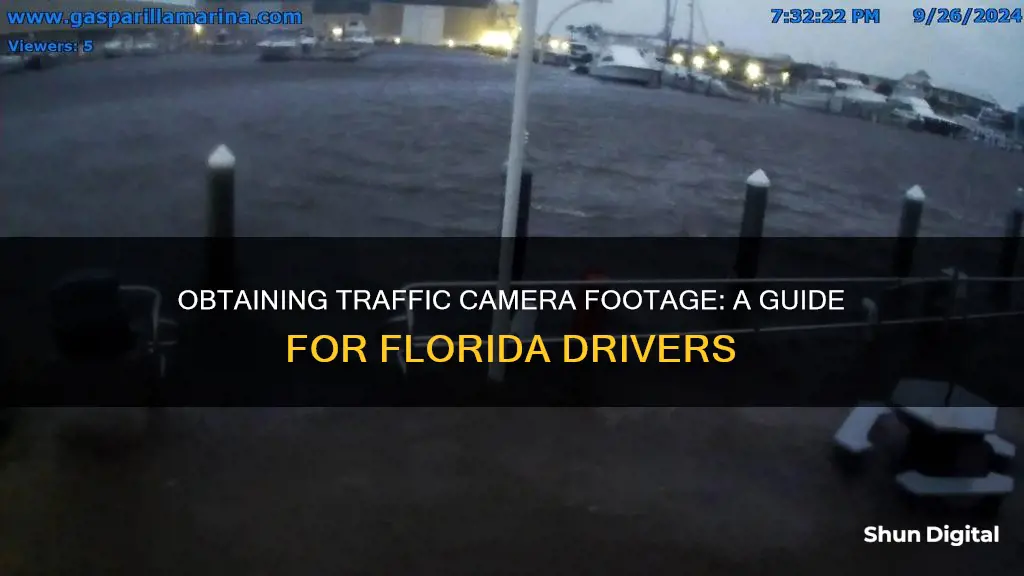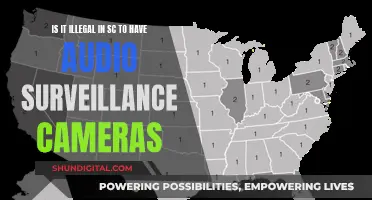
Traffic camera footage is often crucial in the aftermath of a road accident, offering an unbiased account of events to support insurance claims and legal cases. While there are plenty of traffic and red-light cameras in Florida, obtaining footage can be challenging due to privacy concerns and a lack of standardised laws. In this guide, we will outline the steps to access traffic camera footage in Florida, from understanding the camera systems and relevant agencies to submitting a successful request and dealing with potential delays or denials. We will also discuss alternative sources of evidence and the importance of acting quickly to secure crucial footage.
| Characteristics | Values |
|---|---|
| Purpose of obtaining traffic camera footage | Proving innocence or guilt in a traffic violation, supporting an insurance claim, or facilitating urban planning research |
| Types of traffic cameras in Florida | Red-light cameras, speed cameras, and CCTV cameras monitoring highways and intersections |
| Control of traffic cameras in Florida | Florida Department of Transportation, local municipalities, counties, or private entities |
| Legal requirements for accessing footage | Must have a valid reason, comply with Florida's Public Records Law, and make a proper request |
| Steps to access footage | Determine a valid reason, identify the relevant government agency, submit an official request, provide relevant information, and follow up |
| Fees | Vary depending on the government agency and purpose of the request |
| Timeframe for obtaining footage | Critical to act quickly as footage may be stored for a limited time, typically 24-90 days |
What You'll Learn

Identify the type of camera and the agency that operates it
To identify the type of camera that may have captured an incident, it is important to understand the different types of traffic cameras in Florida. The state employs several types of cameras as part of its traffic camera system, including:
- Red-light cameras: These cameras are typically situated at busy intersections to capture instances of vehicles running red lights. They are often bulkier with a large camera box and two external flash units, and there may be multiple cameras at each intersection to capture different angles.
- Speed cameras: These cameras monitor vehicle speed and are usually found on highways, main roads, back roads, or residential areas. They can be fixed, mounted on poles, or mobile, set up by law enforcement and moved around.
- CCTV cameras: These cameras are more versatile and can monitor various situations across roadways, highways, and intersections.
- Traffic sensor cameras: These cameras are used to monitor and manage traffic flow and determine traffic light timing. They are typically small, cylindrical, or dome-shaped, and mounted on top of traffic signals or light poles.
- Automated Number Plate Recognition (ANPR) cameras: These cameras can read and recognize license plates. They can be mobile, mounted on police cruisers, or fixed on poles.
Once you have an idea of the possible camera types, the next step is to identify the specific camera that may have recorded the incident. This requires knowing the exact location and approximate time of the incident. After identifying the camera, you can determine the agency that operates it. In Florida, the custodian of the footage could be the Florida Department of Transportation, a local municipality, or a private entity, such as a shopping mall or housing complex.
Traveling with Camera Gear: Safely Transporting Batteries
You may want to see also

Determine if you have a valid reason for needing the footage
To determine if you have a valid reason for needing traffic camera footage in Florida, it's essential to understand the common purposes for which this footage is sought. Here are some valid reasons that typically justify requesting traffic camera footage:
Accident Investigation
If you were involved in a vehicular accident, traffic camera footage can be invaluable for investigating the incident and determining fault. This footage can provide an unbiased and objective account of the events leading up to and during the accident, helping insurance carriers and legal entities establish liability.
Traffic Violations
Traffic camera footage is often used to address traffic violations such as running a red light or exceeding the speed limit. It can help prove innocence or guilt and play a pivotal role in enforcing traffic laws and ensuring road safety.
Urban Planning and Traffic Management
Beyond individual incidents, traffic camera footage is useful for urban planners, researchers, and traffic management authorities. It helps them study traffic patterns, evaluate the effectiveness of traffic management strategies, and plan infrastructure improvements to create safer and more efficient roadways.
Legal Proceedings
If you are involved in a legal case related to a traffic incident, such as a personal injury claim or lawsuit, traffic camera footage can serve as crucial evidence. It can help your legal team build a strong case and support your claim or defence.
Research and Studies
In some cases, researchers or academic institutions may have valid reasons for requesting traffic camera footage. This could be for research projects, traffic behaviour studies, or other analytical purposes that contribute to a broader understanding of traffic patterns and road safety.
It's important to note that valid reasons for requesting traffic camera footage in Florida generally align with public interests, such as promoting road safety, ensuring fair legal proceedings, and contributing to urban planning and traffic management initiatives. If you believe you have a valid reason, it's recommended to consult with a legal professional who can guide you through the process of obtaining the footage.
Measuring Focus: Black and Blue Camera Tips
You may want to see also

Contact the relevant government agency
Contacting the relevant government agency is a crucial step in obtaining traffic camera footage in Florida. The specific agency you need to reach out to will depend on the type of camera involved and its location. Here is a detailed guide to help you through this process:
Identifying the Responsible Agency
The first step is to determine which government agency manages the specific cameras related to your incident. In Florida, the Florida Department of Transportation (FDOT) oversees many of the state's traffic cameras. However, local municipalities, counties, or private entities may control some cameras. For example, cameras monitoring highways and main roads might be under the jurisdiction of the FDOT, while cameras at busy intersections could be managed by a local municipality. It's important to identify the correct agency to direct your request accurately.
Understanding the Camera System
Before contacting the relevant agency, it's helpful to understand the basics of Florida's traffic camera systems. The state has an interconnected network of devices, including red-light cameras, speed cameras, and CCTV cameras, all designed to monitor and regulate traffic flow. By understanding the type of camera and its purpose, you can better identify the responsible agency.
Making Contact and Requesting Footage
Once you've identified the appropriate agency, you can initiate contact. It's recommended to make your request in person by visiting the local city offices or police station. Ask the clerk or office staff for a Freedom of Information Act (FOIA) request form, which is typically required for accessing traffic camera footage. Be prepared to provide specific details about the incident, including the date, time, and location, as well as the reason for your request. You may also need to submit any relevant documentation or reports related to the incident.
Following Up on Your Request
After submitting your request, maintain regular communication with the government agency. Follow-up inquiries are important to ensure your request receives proper attention and progresses through the system. Each agency may have its own procedures and timelines for handling these requests, so staying in touch can improve your chances of receiving a prompt response.
Understanding Costs and Delays
Obtaining traffic camera footage may incur costs, such as fees for the time spent by the agency to retrieve and copy the footage and the cost of any physical media used for delivery. Inquire about these costs beforehand to avoid unexpected expenses. Additionally, be prepared for potential delays or even denials. Delays may be due to the agency's workload, the complexity of your request, or legal considerations. If your request is denied, the agency should provide a reason, and you can seek legal counsel if you believe the denial is unjustified.
Seeking Legal Assistance
Obtaining traffic camera footage in Florida can be a complex and time-sensitive process. Working with an attorney can significantly improve your chances of success. Attorneys can file subpoenas with local or state government agencies to obtain the footage and navigate any legal requirements or challenges that may arise. They can also advise you on your rights and options if your initial request is denied.
Blind Spot Camera: Right-Side Safety for Cars
You may want to see also

Submit an official request
Once you've established a valid reason for needing traffic camera footage, the next step is to submit an official request. This is a crucial step in obtaining the footage you need and must be done in writing. You can do this by filling out an official form provided by the relevant agency. Be sure to provide precise details, including the date, time, and location of the incident, as well as the reason for your request and your contact information.
It is important to direct your request to the correct agency. In Florida, this could be the Florida Department of Transportation, a local municipality, or even a private entity. The managing agency will depend on the location of the cameras involved in the incident.
When submitting your request, be mindful of any costs that may be associated with obtaining the footage. These costs could include fees for the time spent retrieving and copying the footage, as well as the cost of any physical media used for delivery. Inquire about these charges beforehand to avoid unexpected expenses.
Keep in mind that there may be time constraints involved. Traffic camera footage is usually stored for a limited period, typically between 24 and 90 days, before being overwritten or erased. Therefore, it is essential to act promptly to increase your chances of successfully obtaining the footage.
If your request for traffic camera footage is denied, you can seek legal advice. An attorney can advise you on your options, which may include appealing the decision or pursuing alternative forms of evidence, such as eyewitness statements or dashcam footage.
Traffic Cameras in Oregon: Are They Legal?
You may want to see also

Provide all relevant information and documents
To obtain traffic camera footage in Florida, you will need to provide all relevant information and documents to support your request. This is a crucial step in the process, as it helps expedite the retrieval of the desired footage. Here's a detailed breakdown of the information and documents you should include:
- Accident Reports: Provide a copy of the official accident report filed with the police or relevant authorities. This report should include details such as the date, time, and location of the incident, as well as any relevant information about the vehicles involved.
- Police Reports: If a police officer was present at the scene or responded to the incident, include a copy of their report. The police report may contain valuable information about the circumstances of the accident, witness statements, and any initial findings.
- Legal Case Details: If your request for traffic camera footage is related to an ongoing legal case, be sure to include relevant case information. This may include case numbers, the names of the parties involved, and the specific details of the incident that the footage will help clarify.
- Location and Time of the Incident: Clearly specify the exact location and time of the incident. This information will help identify the relevant traffic cameras that may have captured the footage. Be as precise as possible, including the date, time of day, and specific address or intersection.
- Your Contact Information: Provide your contact details, such as your name, phone number, and email address. This will allow the relevant agency to get in touch with you regarding your request and any updates on its progress.
- Reason for the Request: Explain why you are requesting the traffic camera footage. Common reasons include accident investigations, insurance claims, legal cases, or research purposes. Be clear and concise in stating your purpose, as it will help demonstrate the validity of your request.
It is important to note that the specific information and documents required may vary depending on the agency handling your request. Be sure to review the guidelines provided by the Florida Department of Transportation or the local municipality responsible for the traffic cameras in the area of interest. Their websites may provide specific instructions on the documentation needed to process your request efficiently.
Unveiling Camera Raw Panel in Bridge: A Step-by-Step Guide
You may want to see also
Frequently asked questions
Identify the camera's location and custodian agency, then submit a public records request. Costs and processing times may apply.
Traffic cameras in Florida are controlled by the Florida Department of Transportation, local municipalities, or private entities like shopping malls and housing complexes.
Florida uses red-light cameras, speed cameras, and CCTV cameras. Red-light cameras monitor intersections, speed cameras monitor highways, and CCTV cameras cover various roadways.
Accessing footage from privately-owned traffic cameras typically requires direct requests to the owner. They may voluntarily share the footage or do so if a court order is provided.







